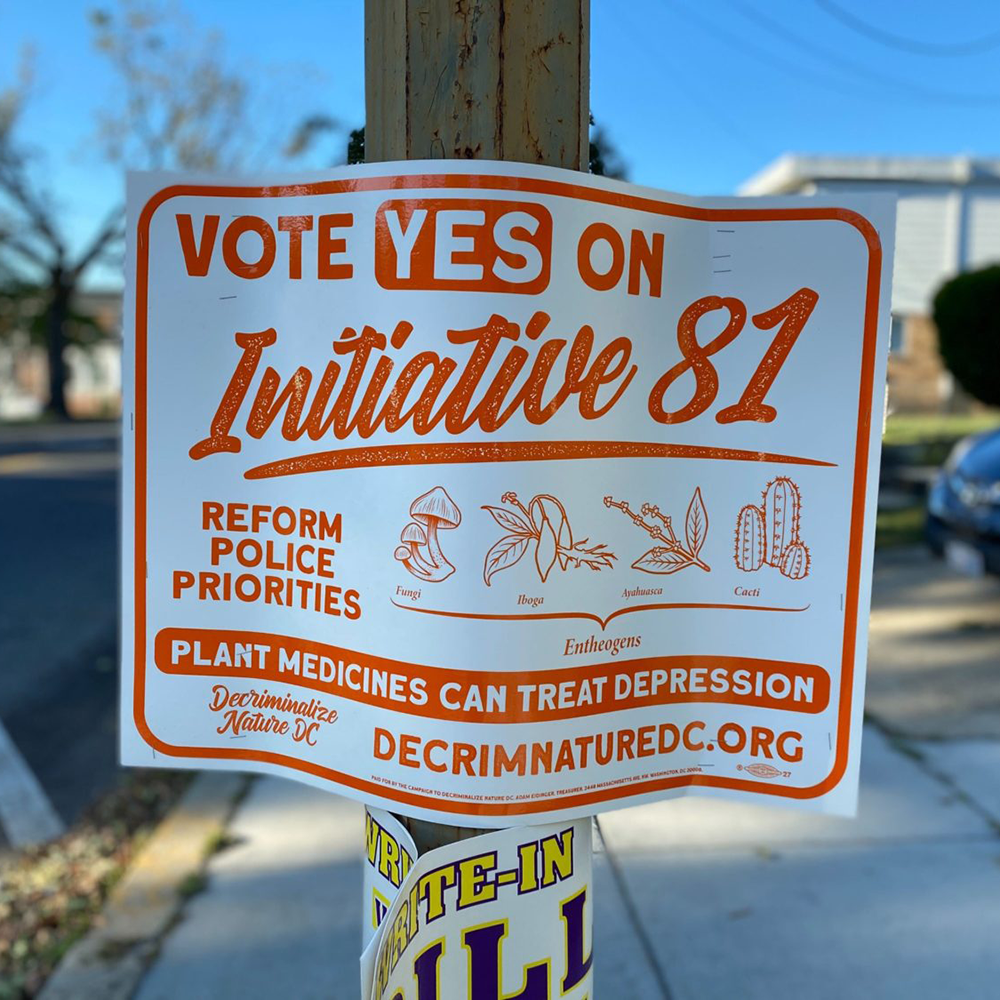Thirteen years after Melissa Lavasani emerged from Macalester College as a star on her tennis team, she was crawling up her stairs at the end of every day. It was then that Lavasani, who was suffering from postpartum depression, discovered psilocybin, the psychoactive component found in magic mushrooms. She began to feel human again.

“My life has transformed,” Lavasani said before the Washington, D.C. Board of Elections in January. “Entheogenic plants and fungi empowered me to take control and to make the necessary changes to save my life.”
Lavasani’s experience of the healing potential of psilocybin inspired her to submit the paperwork to put Initiative 81 on D.C.’s ballots this past Election Day. The initiative makes entheogens, chemical substances with psychoactive effects frequently used for spiritual development or religious rituals, among the lowest law enforcement priorities for the Metropolitan Police Department.
On Nov. 3, voters in the District passed Initiative 81. Now, it moves to the D.C. City Council for review and then to Congress before it can become law, as per the D.C. Home Rule Act.
Initiative 81 does not legalize entheogenic plants and fungi such as psilocybin mushrooms, but instead declares D.C.’s enforcement of drug laws against these substances as the lowest priority. It also calls on the D.C. Attorney General and U.S. Attorney for D.C. to cease the prosecution of residents who engage with these drugs.
Lavasani was inspired by a growing body of research that suggests America’s current mental health treatment system is failing.
“Right now, we have an illness care system,” Lavasani said in a phone interview with The Hoya. “There are for-profit companies making money off of us being sick.”
Lavasani noted that despite tremendous breakthroughs through antidepressants such as Prozac, depression remains the leading cause of disability worldwide.
Leading medical institutions such as Johns Hopkins University, New York University, Stanford University and the University of California at Los Angeles are all currently contributing to the growing field of medical literature studying the effectiveness of psilocybin in treating mental illness, according to Lavasani, who is part of the campaign Decriminalize Nature D.C., which hopes to increase accessibility to entheogens.
“When I was growing psilocybin in my house, I was very fearful that the wrong person was going to find out, and I would have lost my job. Something would have impacted my kids,” Lavasani said. “People who are using this to heal themselves shouldn’t feel the fear from the war on drugs.”
Initiative 81 works to realign policing away from the logic of the war on drugs, according to Lavasani.
“We are the only police reform measure on the ballot,” Lavasani said. “We need to be looking at what role does police play in our communities and what needs to change with that.”
Lavasani emphasized that police disproportionately enforce strict anti-drug laws against people of color.
“We all know that Black and brown people are subject to policing in very different ways than other groups of people, or other demographics are,” Lavasani said. “White people have the agency to try and experiment with these types of things without really fearing that they’re going to lose a lot in their lives. Why should Black and brown communities be robbed of that experience as well?”
Lavasani’s campaign has not gone unopposed, with area officials like Rep. Andy Harris (R-MD) arguing the measure is inadvisable and reckless.
“This is a bald-faced attempt to just make these very serious, very potent, very dangerous — both short-term and long-term — hallucinogenic drugs broadly available,” Harris said to the New York Post.
D.C. Mayor Muriel Bowser came out against Initiative 81, saying she did not usually endorse measures not created for the District specifically.
“It seems like the issue is not an organically D.C.-created initiative, and I don’t typically favor those. I won’t be voting for it,” Bowser said in a news conference Oct. 26.
Lavasani said campaigning during a pandemic has posed challenges for her and her team.
“Normally I would be doing events in the evenings. On the weekends I’d be running all over the city being in living rooms of friends who invite their friends over and speaking to them about this issue. We just haven’t been able to do that,” Lavasani said. “It’s forced us to be really creative with how we get the word out about us.”
In the run-up to the Nov. 3 election, Lavasani’s posters hung in nearly every street of the District. The campaign’s outreach led to an endorsement from the Democratic Party and support from the Green Party, Libertarian Party and various environmental and healthcare groups, according to Lavasani.
Lavasani believes Georgetown University students are witnessing a special moment in the nation’s history, with many cities across the country passing similar measures similar to Initiative 81.
“I think the entire country is watching this right now: Denver, Oakland, Santa Cruz; Oregon has the measure on the ballot; Ann Arbor passed, but Washington, D.C., is the capital of our nation,” Lavasani said. “As a student of Georgetown, you’re in the thick of it, and this is really history being made in your backyard.”
Still, for Lavasani and her team, the focus is transforming the American healthcare system.
“This movement that’s happening right now, 100 cities have groups formed for Decrim,” Lavasani said. “This could potentially truly change how our entire healthcare system works, and it’s going to improve things for the better.”




















